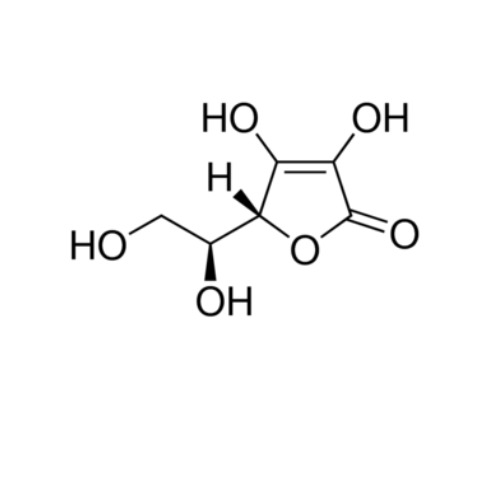Synonyms: Vitamin C
Cas No. 50-81-7
Molecular Weight: 176.13
Description:
L-Ascorbic Acid is a powerful antioxidant and plays a vital role in many physiological functions.
Chemical Structure:
- It is a water-soluble compound.
- Its structure is a six-membered ring with hydroxyl groups attached, making it highly reactive and capable of neutralizing free radicals in the body.
Functions and Benefits:
- Antioxidant Activity:
- It helps protect cells from damage by neutralizing free radicals, which can otherwise lead to oxidative stress and contribute to aging and disease.
- Collagen Synthesis:
- L-Ascorbic Acid is essential for the synthesis of collagen, a protein that provides structure to the skin, blood vessels, and connective tissues. This is why Vitamin C is often associated with healthy skin.
- Immune Support:
- Vitamin C boosts the immune system by stimulating the production of white blood cells and promoting their function. It also helps the skin act as a barrier to pathogens.
- Iron Absorption:
- L-Ascorbic Acid enhances the absorption of non-heme iron (the type found in plant-based foods), which is important for preventing iron-deficiency anemia.
- Wound Healing:
- Due to its role in collagen production, Vitamin C is crucial for proper wound healing and tissue repair.
- Neurotransmitter Synthesis:
- It plays a role in synthesizing neurotransmitters like dopamine, which is involved in mood regulation.
- Prevention of Scurvy:
- A deficiency in Vitamin C can lead to scurvy, a condition marked by weakness, gum disease, and skin problems.
Dietary Sources:
L-Ascorbic Acid is found in a wide variety of fruits and vegetables. Some of the richest sources include:
- Citrus fruits (oranges, lemons, grapefruits)
- Strawberries
- Kiwi
- Bell peppers
- Broccoli
- Brussels sprouts
- Tomatoes
- Spinach
Daily Recommended Intake:
- The recommended daily intake varies by age, sex, and life stage. For adults, L-Ascorbic Acid typically around 65–90 mg per day, with an upper limit of 2,000 mg per day to avoid potential side effects like stomach upset.
Skincare Benefits:
- Brightening & Hyperpigmentation: It is a popular ingredient in skincare for its ability to brighten skin tone and reduce dark spots or hyperpigmentation caused by sun exposure or acne scarring.
- Anti-Aging: Its antioxidant properties help protect against damage from UV rays and pollution, which can accelerate aging.
- Collagen Production: L-Ascorbic Acid promotes collagen synthesis, making the skin firmer and more youthful.
Topical Use in Skincare:
- Stability:It is sensitive to light, air, and heat, which can cause it to degrade. That’s why it’s often packaged in opaque, airtight containers, and it’s recommended to store it in a cool, dark place.
- Concentration: Skincare products typically contain ascorbic acid in concentrations ranging from 5% to 20%. Higher concentrations can be more effective but may also cause irritation for sensitive skin.
Possible Side Effects:
- In skincare, high concentrations of ascorbic acid can cause skin irritation, redness, or dryness, especially for those with sensitive skin. It’s usually advised to patch-test new products.
- In excessive amounts through supplementation, It can lead to digestive disturbances like diarrhea or kidney stones.
Specification:
Purity: 99%
Color: White
Form: Crystalline powder



Reviews
There are no reviews yet.